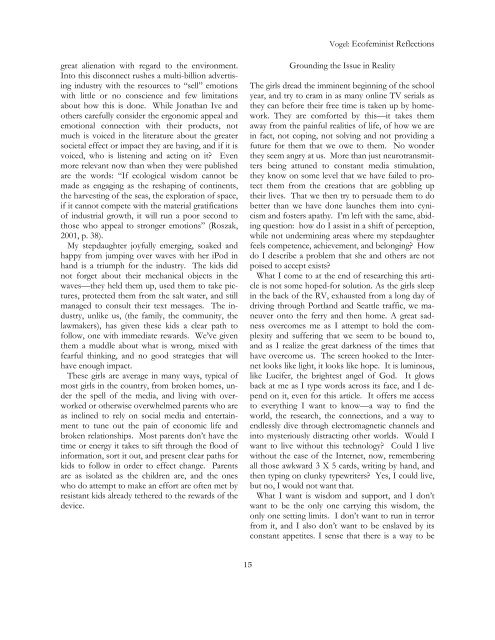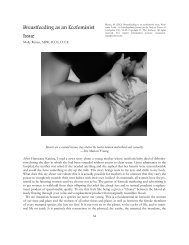RE:IJSNC, Issue 1, Volume 2, May 2012 - Ocean Seminary College
RE:IJSNC, Issue 1, Volume 2, May 2012 - Ocean Seminary College
RE:IJSNC, Issue 1, Volume 2, May 2012 - Ocean Seminary College
You also want an ePaper? Increase the reach of your titles
YUMPU automatically turns print PDFs into web optimized ePapers that Google loves.
great alienation with regard to the environment.<br />
Into this disconnect rushes a multi-billion advertising<br />
industry with the resources to “sell” emotions<br />
with little or no conscience and few limitations<br />
about how this is done. While Jonathan Ive and<br />
others carefully consider the ergonomic appeal and<br />
emotional connection with their products, not<br />
much is voiced in the literature about the greater<br />
societal effect or impact they are having, and if it is<br />
voiced, who is listening and acting on it? Even<br />
more relevant now than when they were published<br />
are the words: “If ecological wisdom cannot be<br />
made as engaging as the reshaping of continents,<br />
the harvesting of the seas, the exploration of space,<br />
if it cannot compete with the material gratifications<br />
of industrial growth, it will run a poor second to<br />
those who appeal to stronger emotions” (Roszak,<br />
2001, p. 38).<br />
My stepdaughter joyfully emerging, soaked and<br />
happy from jumping over waves with her iPod in<br />
hand is a triumph for the industry. The kids did<br />
not forget about their mechanical objects in the<br />
waves—they held them up, used them to take pictures,<br />
protected them from the salt water, and still<br />
managed to consult their text messages. The industry,<br />
unlike us, (the family, the community, the<br />
lawmakers), has given these kids a clear path to<br />
follow, one with immediate rewards. We’ve given<br />
them a muddle about what is wrong, mixed with<br />
fearful thinking, and no good strategies that will<br />
have enough impact.<br />
These girls are average in many ways, typical of<br />
most girls in the country, from broken homes, under<br />
the spell of the media, and living with overworked<br />
or otherwise overwhelmed parents who are<br />
as inclined to rely on social media and entertainment<br />
to tune out the pain of economic life and<br />
broken relationships. Most parents don’t have the<br />
time or energy it takes to sift through the flood of<br />
information, sort it out, and present clear paths for<br />
kids to follow in order to effect change. Parents<br />
are as isolated as the children are, and the ones<br />
who do attempt to make an effort are often met by<br />
resistant kids already tethered to the rewards of the<br />
device.<br />
15<br />
Vogel: Ecofeminist Reflections<br />
Grounding the <strong>Issue</strong> in Reality<br />
The girls dread the imminent beginning of the school<br />
year, and try to cram in as many online TV serials as<br />
they can before their free time is taken up by homework.<br />
They are comforted by this—it takes them<br />
away from the painful realities of life, of how we are<br />
in fact, not coping, not solving and not providing a<br />
future for them that we owe to them. No wonder<br />
they seem angry at us. More than just neurotransmitters<br />
being attuned to constant media stimulation,<br />
they know on some level that we have failed to protect<br />
them from the creations that are gobbling up<br />
their lives. That we then try to persuade them to do<br />
better than we have done launches them into cynicism<br />
and fosters apathy. I’m left with the same, abiding<br />
question: how do I assist in a shift of perception,<br />
while not undermining areas where my stepdaughter<br />
feels competence, achievement, and belonging? How<br />
do I describe a problem that she and others are not<br />
poised to accept exists?<br />
What I come to at the end of researching this article<br />
is not some hoped-for solution. As the girls sleep<br />
in the back of the RV, exhausted from a long day of<br />
driving through Portland and Seattle traffic, we maneuver<br />
onto the ferry and then home. A great sadness<br />
overcomes me as I attempt to hold the complexity<br />
and suffering that we seem to be bound to,<br />
and as I realize the great darkness of the times that<br />
have overcome us. The screen hooked to the Internet<br />
looks like light, it looks like hope. It is luminous,<br />
like Lucifer, the brightest angel of God. It glows<br />
back at me as I type words across its face, and I depend<br />
on it, even for this article. It offers me access<br />
to everything I want to know—a way to find the<br />
world, the research, the connections, and a way to<br />
endlessly dive through electromagnetic channels and<br />
into mysteriously distracting other worlds. Would I<br />
want to live without this technology? Could I live<br />
without the ease of the Internet, now, remembering<br />
all those awkward 3 X 5 cards, writing by hand, and<br />
then typing on clunky typewriters? Yes, I could live,<br />
but no, I would not want that.<br />
What I want is wisdom and support, and I don’t<br />
want to be the only one carrying this wisdom, the<br />
only one setting limits. I don’t want to run in terror<br />
from it, and I also don’t want to be enslaved by its<br />
constant appetites. I sense that there is a way to be



